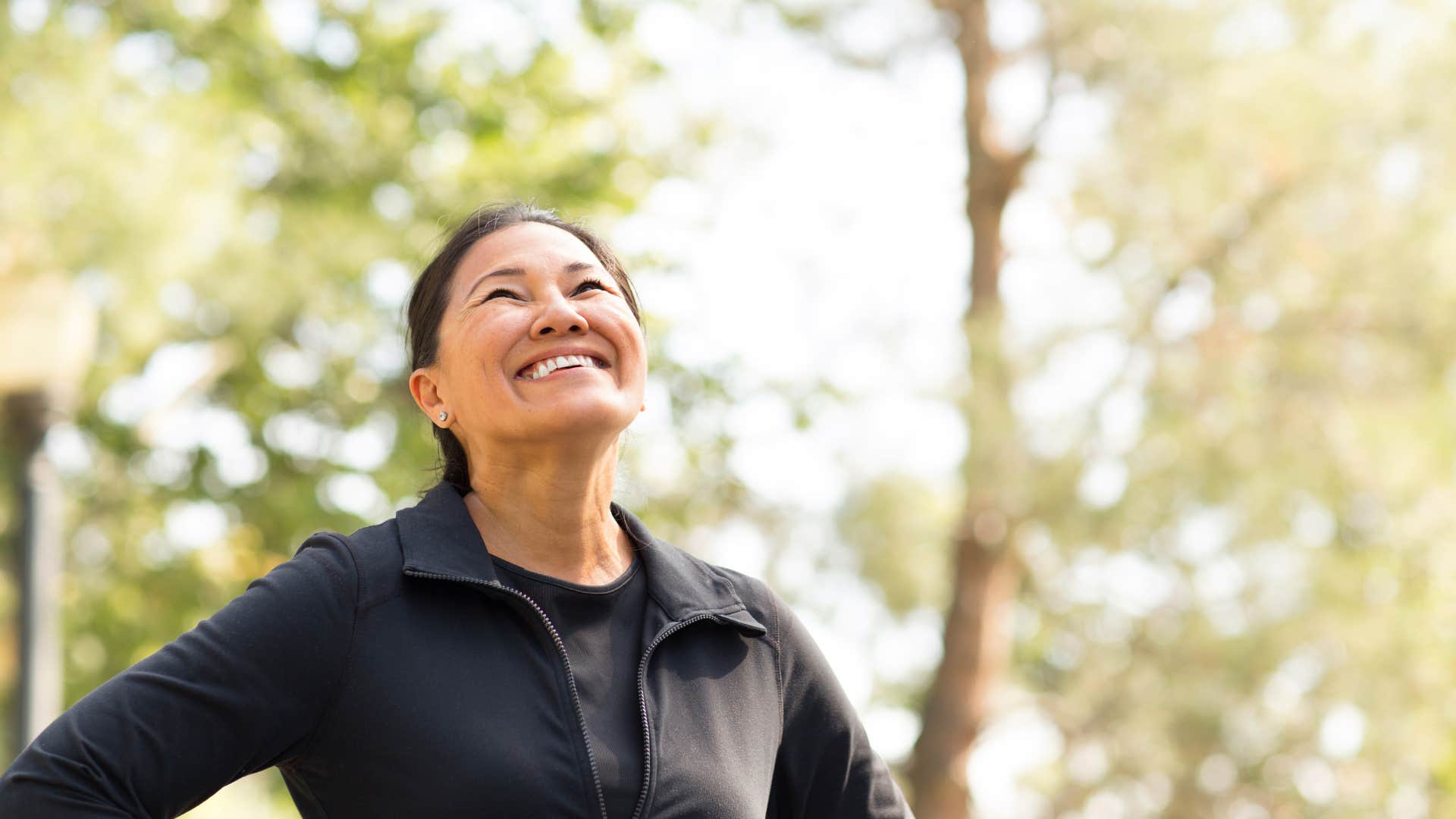11 Small Ways You Can Tell Someone Grew Up Feeling Like A Burden
Not everyone has the luxury of growing up feeling loved and secure.
 AliceCam | Shutterstock
AliceCam | Shutterstock Everyone struggles from time to time, but some people go through really hard times that leave them feeling like they're a burden to those around them. Whether those feelings are justified or not, there's often little that can be done to change that person's mind. If someone grew up feeling this way, it will be even more ingrained in their psyche.
Clinical psychologist Ditta M. Oliker, PhD noted that "the long-term effects of a child internalizing the belief that he or she is a burden... can then feed into a pattern of being an outsider in adulthood." It's easy to think that something that affects you in childhood will only have an impact on you then, but there are small ways you can tell someone grew up feeling like a burden. And these long-reaching effects can be a part of your life well into adulthood.
Here are 11 small ways you can tell someone grew up feeling like a burden
1. They don't like to ask for help
 fizkes | Shutterstock
fizkes | Shutterstock
One of the more obvious but small ways you can tell someone grew up feeling like a burden is that they don't like to ask for help. While they were growing up, they were likely made to feel like asking for help was wrong and asked too much of other people.
Of course, there's nothing wrong with asking for help, but people who grew up feeling like they were a burden will certainly think there is. According to relationship expert Andy Lopata, "If we are asking the right people for help and making it easy for them to help us, why would we be a burden? We are offering them the chance to delight in being a part of our success."
It's true that most people genuinely like to help others, and asking them for help is not a burden in any way. But some people might have grown up in a situation where they had no one to ask other than the wrong people.
Some people are just not going to be helpful, no matter how much you want them to be or how kindly you ask them. This can leave an impression that lasts a lifetime.
2. They're hyper-independent
 pixelheadphoto digitalskillet | Shutterstock
pixelheadphoto digitalskillet | Shutterstock
Anyone can have an independent streak, but this is particularly true for people who felt like a burden growing up. They will feel the need to handle everything on their own. Just like they don't want to ask for help, they don't want people involved in many other areas of their life. They believe they're strong enough to do it on their own, and that's all that matters.
Clinical psychologist Amy Marschall explained that hyper-independence can be a trauma response. "Trauma survivors who experience hyper-independence may believe that they do not deserve support or help from other people," she said. "They might have been told that needing help or receiving support is unacceptable, so they become hyper-independent to avoid having that need."
If someone has gone through the childhood trauma of being made to feel like a burden, it's very possible that they will end up becoming hyper-independent later in life. They don't know how to ask for help and trust others, making anything other than solitude almost impossible to bear.
3. They suffer from low self-esteem
 fizkes | Shutterstock
fizkes | Shutterstock
Someone who grows up feeling like a burden is naturally not going to feel good about themselves. They will most likely be deeply affected by this difficulty in their childhood to the point that they have low self-esteem and don't think very highly of themselves. This can compound the issue of feeling like a burden, making it something that lingers into adulthood.
According to licensed clinical social worker Michelle Risser, "Low self-esteem can make you feel like you don't deserve to be cared for or loved. This can create doubt about whether others genuinely want to be there for you, leading to the belief that asking for help is too much. When you don't see your own value, it's easy to feel like you're placing a burden on others."
If you don't have a good sense of self-worth, you're more likely to feel like you're not worth helping. People who grew up feeling like a burden naturally have a sense of low self-esteem because they don't think they are worth the effort it would take someone to help them. Instead, they rely only on themselves.
4. They're a people-pleaser
 carlesmiro | Shutterstock
carlesmiro | Shutterstock
If someone works hard to overcompensate for the trouble they feel they are causing, it's one of the small ways you can tell someone grew up feeling like a burden. In this case, they'll become a people-pleaser, striving to do everything that those around them want so that they will feel like they are liked. Ironically, this can make the people around them feel like less of a burden.
Licensed marriage and family therapist Jennifer Litner, PhD noted, "People-pleasing behavior can often lead to resentment and relationship burnout, leaving the person experiencing it feeling drained and exhausted. If you exhibit people-pleasing behaviors, you may also be prone to experiencing other mental health conditions, such as depression and anxiety."
Some people may think being a people-pleaser is a good thing. After all, it means you're helping others or making them happy in some way. But this isn't true. It can be detrimental for your personal health and well-being. Being a people-pleaser is one way to ensure you'll never be satisfied.
5. They feel insecure in relationships
 Roman Kosolapov | Shutterstock
Roman Kosolapov | Shutterstock
If someone feels like a burden when they're growing up, it can lead to them feeling insecure in relationships throughout their lives. They may carry the belief that they are a burden with them, which makes them feel less worthy, leading to their relationship insecurities. They could potentially feel unlovable, or even like the other person in the relationship deserves better than what they can offer.
Health writer Sanjana Gupta said, "People with low self-confidence may experience insecurity in their relationships because they may not believe they are worthy of the love or support of their partner. Low self-confidence can often be traced back to experiences like being bullied, teased or abused in childhood."
If relationship insecurity can be caused by low self-confidence, which can be caused by problems during childhood, it's easy to see how this could be an issue for those who grew up feeling like a burden.
If someone doesn't think very highly of themselves, they are bound to have more insecurities about nearly everything in life. This can extend to relationships, where people just may not feel like they're good enough. Clearly, feeling like a burden in childhood has serious implications later in life.
6. They try to do everything on their own
 Kateryna Onyshchuk | Shutterstock
Kateryna Onyshchuk | Shutterstock
Children who feel like a burden growing up will avoid asking for help and do things on their own as much as possible. They won't want to give their family members another task to assist with, so they'll just handle it themselves instead. This is likely to carry over into adulthood. As adults, these people will still plan on doing everything on their own because that is what they are most comfortable with.
Stanford social psychologist Xuan Zhao shared research that revealed that people actually want to help others, even though asking for that help may seem intimidating. So, when someone thinks asking for help is a sign that they are not good enough to do something on their own, they're actually incorrect. Giving others a chance to help is something people want to have.
While it can be tempting to just do everything yourself, especially when you grew up thinking that was the best way to handle things, asking for help is important. You don't have to do everything on your own, no matter what your mind tries to tell you. There are people out there who want to be involved in your life.
7. They have a hard time accepting compliments
 BearFotos | Shutterstock
BearFotos | Shutterstock
If someone grew up feeling like a burden, they probably don't think very highly of themselves. And, of course, having low self-esteem is part of feeling like a burden. This low self-esteem will make it hard for them to accept compliments. It's hard for the average person to accept compliments, really. Most of us just aren't in a headspace in which we naturally take the kind things others say about us to heart.
Well-being consultant Suzie Pileggi Pawelski and psychology expert James Pawelski shared that we are hardwired to either deflect, reciprocate or discount gratitude. This means that before the gravity of a compliment can even sink in for us, we're already trying to move past it or return it. This doesn't give us the time needed to savor it.
It can be hard to accept compliments, especially when your self-esteem is in short supply. This is like a perfect storm for people who grew up feeling like a burden. But there's no need to run from compliments and gratitude, even though they can feel a bit uncomfortable sometimes.
8. They apologize often
 Mix and Match Studio | Shutterstock
Mix and Match Studio | Shutterstock
We all know someone who apologizes way too frequently. If someone grew up feeling like a burden, this is only more likely to occur. Because they were made to feel like a nuisance, they think everything is their fault, even though it's not. This will lead to them apologizing often for things they did, or things they are worried it could be perceived they did, or things they didn't do at all.
Therapist Jocelyn Hamsher linked frequent apologies back to people-pleasing. "With people-pleasing, over-apologizing is motivated by trying to manage the other person's emotions and make them feel better," she said. "Even if you weren't the one to cause harm because you're uncomfortable when other people aren't happy."
Wanting others to be happy can lead to you saying "sorry" a lot, especially when you think it will make a situation better. But if there's no need to apologize, you don't have to do it. You don't owe anyone an apology when you did nothing wrong. Even if your past of being treated like a burden tells you otherwise, it's okay to move forward.
9. They're easily bullied
 Prostock-studio | Shutterstock
Prostock-studio | Shutterstock
We often think of bullies as being something we encounter in childhood on the playground. However, bullies can show up in different circumstances throughout life.
If someone has low self-esteem because they feel like they are a burden, they may even feel like they deserve this kind of mistreatment because they think so little of themselves. Being bullied has just become a part of life for them, even in adulthood, and is one of the other small ways you can tell someone grew up feeling like a burden.
According to the U.S. Government's Stop Bullying website, those who have low self-esteem are indeed at a higher risk for being bullied, as are those who are already depressed or anxious. The same is true for the unpopular or people who are considered different in some way. Again, while this is most often associated with children, it is really true for all age groups.
If someone is already dealing with low self-esteem because they're overly sensitive as a result of their upbringing, or perhaps are dealing with mental health issues because of it, they are more susceptible to bullying. This empowers bullies and makes them feel like they wield more power and can do more to shame the people around them. It is, in many ways, a vicious cycle.
10. They aren't motivated
 NDAB Creativity | Shutterstock
NDAB Creativity | Shutterstock
A child who grows up feeling like a burden may feel like there is no reason to try hard in school or attempt to make friends. This can continue into adulthood, when they will hold themselves back from excelling because they just don't see the point.
This can affect everything from work to relationships. Often, people who have felt like a burden at some point just feel more comfortable hiding than they do putting themselves out there and shining.
Psychotherapist Amy Morin wisely stated, "Sometimes, no motivation can be the problem. At other times, it's merely the symptom of a bigger problem." We will all have times in our life where we will feel unmotivated, but often feeling that way is actually a sign that something bigger is going on, like thinking you have been a burden for most of your life.
If someone grew up feeling like a burden, they will likely face a lack of motivation throughout their life. They will just naturally not feel the push to succeed. This is not just due to a general lack of motivation, which many people have, but a direct cause of being made to feel like a burden. It is indeed the symptom of the bigger problem.
11. They're afraid of rejection
 PeopleImages.com - Yuri A | Shutterstock
PeopleImages.com - Yuri A | Shutterstock
If someone grew up feeling like a burden, there's a pretty good chance that they are already used to rejection. They were likely rejected often as a child when they asked for help. Because of this, they'll have a strong fear of facing this same rejection over and over again. As an adult, this can lead to ruined relationships because those who grew up feeling like burdens won't be able to trust properly.
Mental health writer Lisa Fritscher noted that a fear of rejection can have huge effects on people's lives. It can impact interviews, business, socializing and dating. "The fear of rejection might drive you to engage in behaviors like passive-aggressiveness, passivity and people-pleasing," she warned. "It can also undermine your authenticity and make it difficult to be yourself when you are around others."
Feeling like a burden means someone will have a natural fear of rejection, as it is something they have probably already experienced. Going into adulthood, they will continue to feel this way, which will affect their behavior and their ability to form relationships.
Mary-Faith Martinez is a writer with a bachelor's degree in English and Journalism who covers news, psychology, lifestyle, and human interest topics.

